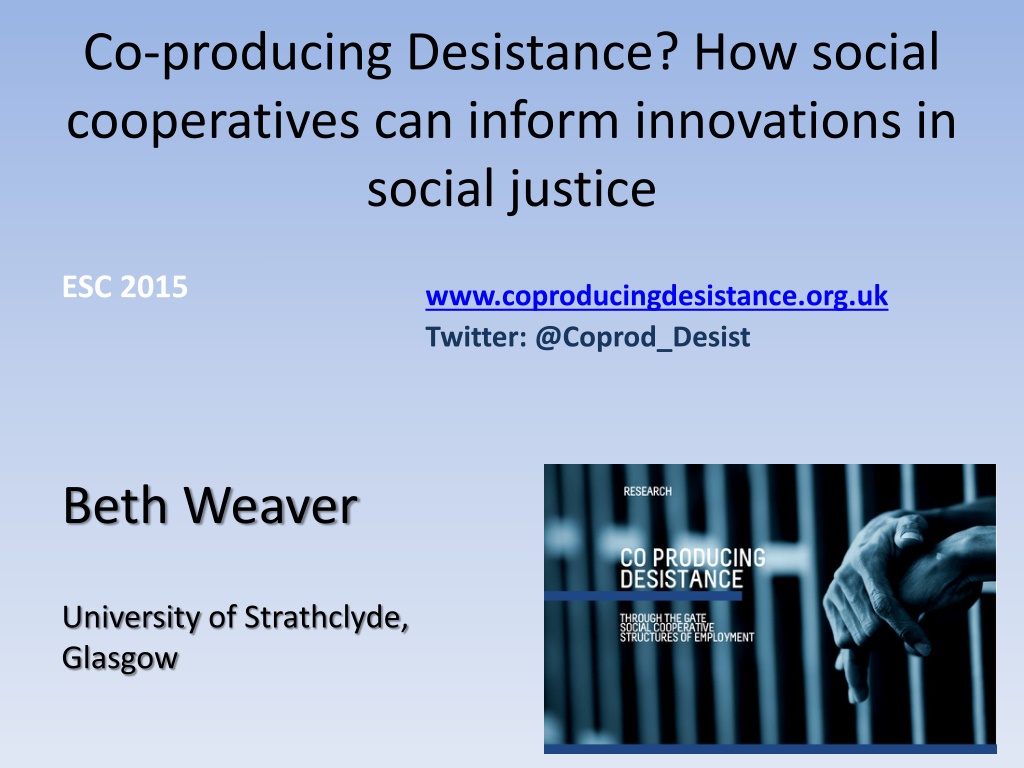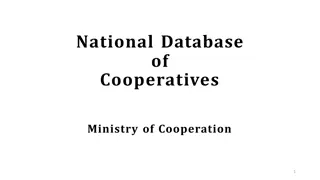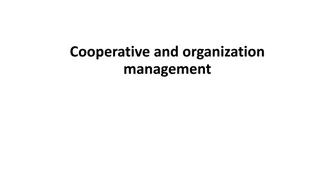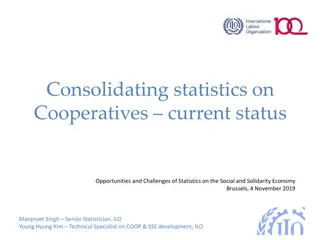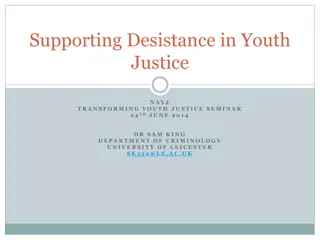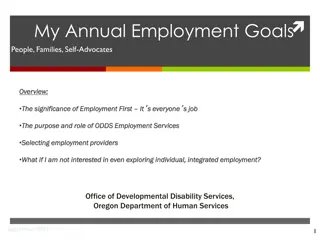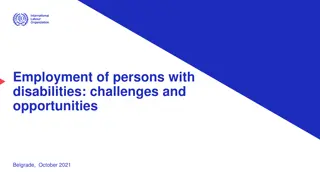Understanding the Role of Social Cooperatives in Desistance and Employment Integration
Exploring the intersection of social cooperatives, desistance, and employment integration, this research delves into the impact of work on individuals' identities and social integration. It discusses the challenges and opportunities in supporting work reintegration, particularly in the UK and Italian contexts, highlighting the importance of meaningful employment for individuals transitioning from the criminal justice system. The study presents insights from interviews with former prisoners and professionals, shedding light on the significance of work and community values in promoting desistance.
Download Presentation

Please find below an Image/Link to download the presentation.
The content on the website is provided AS IS for your information and personal use only. It may not be sold, licensed, or shared on other websites without obtaining consent from the author. Download presentation by click this link. If you encounter any issues during the download, it is possible that the publisher has removed the file from their server.
E N D
Presentation Transcript
Co-producing Desistance? How social cooperatives can inform innovations in social justice ESC 2015 www.coproducingdesistance.org.uk Twitter: @Coprod_Desist Beth Weaver University of Strathclyde, Glasgow
Employment and Desistance How and why does work matter and what does it mean to matter ? It is the meaning and outcomes of either the nature and/or quality of the work, or simply participation in employment, and how these experiences influence an individual s self-concept and social identity - as well as how they interact with a person s priorities, goals and relational concerns that count (Weaver, 2015).
Where have we got to with supporting work integration in the UK? Not very far Working prisons (MOJ 2010) are about employment-as-occupation as a form of discipline and instilling a work ethos. Work is unpaid well, average is 30 pence per hour (national min. wage for adults is 6.15) On release mandatory unpaid work placements and heavy financial sanctions in the event of non-compliance.
The Italian context: The Potential of Social Co-ops Network relationships and external ties can influence the internal equilibrium of the [co-op], because internal norms develop in connection with the social values prevalent in the community (Borzaga and Depredi forthcoming) Work with family life and house this is a cultural norm of this area. These are the three values that have been chosen by the coop to respect the community culture (Professional_9) Work is much more important even than the value placed on family and the home because article 1 of our constitutional law said that our republic is based on work (Professional_12)
Methods and Demographics In this phase: semi-structured interviews with 40 people; 22 were prisoner / former prisoners and 18 were professionals. Some demographics of workers Gender: 6 female, 16 male Ethnicity (self defined): 1 x Roma; 1 x Tunisian; 2 x Romanian; 1 x Columbian; 1 x Dominican; 16 Italians Offending type: Robbery n =5; Drug related n =7; Homicide n=6; Violence (other) n=1; Various n=2; Property n=1 Sentence history 1stperiod of imprisonment n= 8; 2nd period of imprisonment n= 5; significant recidivists n = 5 [n.b not all former prisoners offered this information]
What it means to work: workers views Instrumental incentives and outcomes A cultural norm - and the constraints and conditions of social welfare and penal policies The relational context and outcomes of work To be working alongside others is really important and working together makes you feel connected to something. Before I felt so isolated. There is a sense of togetherness among the women working in here (Worker, Female, Age 32_6) providing a job is not the only thing but through work, we put the person at the centre of our relations inside the co-op. The social relationships within the cooperative and the feelings that develop among people who belong to the coop are the most important part of the rehabilitative journey (Professional_1)
What it means to work: workers views A symbolic or communicative aspect to work, in terms of what it signifies to and about oneself I had the need to show myself that I was able to work and so it is that I am (Worker, Male, Age 33_18) And to others To show that I am able to change my behaviour and that I can behave responsibly and reliably It shows that when I am released, I can be trusted, I am reliable (Worker, Male, Age 45_4) I have to show to my family that I am a different person and I have noticed that they are looking at me with different eyes (Worker, Male, Age 43_10) Negatives relate to the level of pay although this varies between coops some mirror that of private sector; for others its can be 200 euros less per month. Overall self-reported job satisfaction was high.
What it feels like to work for a social cooperative In prison, its mainly about having a job and getting an income to save for release: the co-operative culture is constrained by the environment. The ethics of the co-op is one of inclusion; it is to move toward, to develop, active citizenship. It is a way of acting or being (Professional_2) In the cooperative, we all have to cooperate with each other and so the way we relate to and interact with each other is different the whole experience is different. It is a matter of responsibility. We are all part of something that together is collectively owned. A boss [in a private firm] can instruct you to do something but, whatever way, the final product belongs to him or to her. You produce it for them. It is not yours. In a co-op the final product is yours, so you are invested in the whole process. A cooperative depends on cooperation. It cannot function any other way so unlike the private sector, there is a chain of responsibility rather than a chain of command so, if I make a mistake, there is no sanction or punishment we work together, all of us, to find the solution. (Worker, Female, Age 40_5)
The role of the co-op in supporting social integration Work is central to resocialisation into the outside world and this means that you need this re-education of the outside world while you are in prison I mean in terms of being in the world and building a life (Worker, Female, Aged 41_7) You need to pass through the co-op to start being reintegrated into society. The co-op is the right mechanism for coming out of prison because you need to start down a different path [it] helps you learn how to cope with the demands of work and how to manage social relationships. (Worker, Male, Aged 43_10) The most important fact is the capacity to feel, to be part of a group, a sort of family. In this way they start to rebuild or build positive relationships (Professional_2)
What reintegration means Working for the coop has given me a sense of what it is to be normal and to take responsibility [it] has taught me how to live normally, within the rhythm of life (Worker, Male, Age 35_11) I feel that I am well accepted by people for what I am, as a normal person and not as a former prisoner. This is a very important element to improve your self-confidence people from the area, not only from the coop, treat me as a normal person (Worker, Male, Age 46_20)
The recidivism question In [our] experience, the recidivism rate is very low: 2- 3% (Professional_4) I don t have a percentage in my mind but it is well known that the employment opportunities provided by the cooperative help to stop recidivism (Professional_6) We don t have an absolute percentage we can see that of the people we work with in the cooperative, 70% of people don t commit crime again, while the percentage is the other way round in the case of people that aren t involved in the coop (Professional_8)
Value added Route into employment in the first instance: overcome discrimination in labour market Provides a protected environment: people before profit Holistic and individualised resettlement support for both former/prisoner and their family The networked and cooperative culture and practice provides a range of concrete opportunities for social integration.
Some implications To support social integration and desistance, we need to look beyond the practices and proclivities of the justice sector alone and we need to move beyond our preoccupation with risk and recidivism. If we are serious about supporting social integration and desistance, we need to develop collaborative approaches that engage constructively with the communities that we are trying to support integration to. But -those approaches need to be grounded in particular values, principles and practices if they are to achieve the kinds of outcomes I have mentioned here today.
